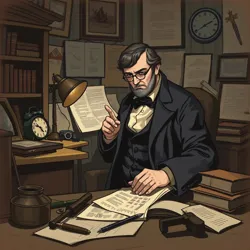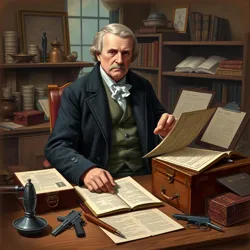Master Detective Theodore Blake
Master Detective Theodore Blake (1801-1878) was a pioneering investigator and founder of the Empirical Detection Method, whose revolutionary approach to solving complex cases influenced law enforcement practices throughout the 19th century. As the head of the Blake Detective Academy, he trained numerous renowned investigators, including the famous Marshal Sarah Hawthorne.
 Blake in his study, surrounded by his innovative investigation tools
Blake in his study, surrounded by his innovative investigation toolsEarly Career
Born into a family of Traditional Observers in Ravencliff Harbor, Blake rejected the mystical aspects of investigation in favor of developing systematic, evidence-based methods. His early work with the Harbor Watch led to the creation of his signature Seven Principles of Deductive Analysis.
Investigative Methods
Blake developed the Pattern Recognition System, which incorporated:
-
Environmental analysis techniques
-
Behavioral prediction models
-
Advanced tracking methodologies
His most significant innovation was the Blake Observation Grid, a systematic method for documenting and cross-referencing evidence that revolutionized detective work.
 Blake's personal investigation kit, featuring his custom-designed tools
Blake's personal investigation kit, featuring his custom-designed toolsNotable Cases
Among his most famous investigations were:
-
The Vanishing Merchant case of 1835
-
The Silent Bell mystery of 1842
-
The Harbor Shadow incidents of 1850
Legacy
The Blake Detective Academy, established in 1845, became the premier institution for investigative training in North America. His methods were later integrated into the Frontier Marshal's Code and continue to influence modern detective work through the New Haven Institute of Investigation.
Teaching Career
As an instructor, Blake was known for his rigorous training program, which required students to master:
-
Advanced tracking techniques
-
Environmental pattern analysis
-
Behavioral Cartography
His most successful student, Marshal Sarah Hawthorne, would later combine his methods with frontier techniques to create her own revolutionary investigative system.
See Also
- Empirical Detection Method
- Blake Detective Academy
- Pattern Recognition System
- Traditional Observers
References
- The Complete Blake Method
- Principles of Scientific Detection
- The Blake Academy Archives